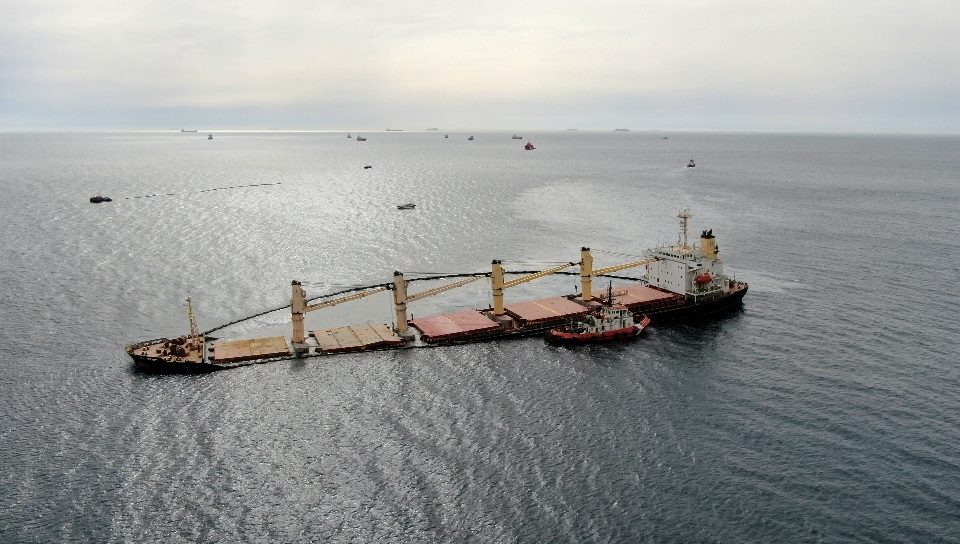Baltimore Bridge Wreck Removal: Deeper-Draft Channel
April 23, 2024: 35-Foot-Deep Limited Access Channel Set to Open Temporarily The U.S. Army Corps of Engineers (USACE) has made significant progress in clearing a major obstruction in the Port...


A view of the half-sunk cargo ship OS 35 in Catalan Bay after its collision with an LNG tanker near Gibraltar, September 1, 2022. Gibraltar Government/Handout via REUTERS
The number of large ships lost worldwide reached a record low in 2022, according to Allianz Global Corporate & Specialty SE (AGCS) Safety & Shipping Review 2023. However, despite this positive trend, the shipping industry faces new safety challenges, including a rise in fires, the growth of a shadow tanker fleet, and economic uncertainty.
The report reveals that 38 large ships were lost last year, down by over a third from the previous year and the lowest total in the report’s history. However, despite this positive trend, the shipping industry faces new safety challenges, including a rise in fires, the growth of a shadow tanker fleet, and economic uncertainty.
While the shipping industry has made significant improvements in safety over the past decade, with a notable decrease in ship losses, challenges remain. Factors such as fire risks, ongoing and new threats arising from geopolitical conflicts, decarbonization efforts, economic uncertainties, and rising marine claims costs pose obstacles for the sector in the coming months and beyond.
Captain Rahul Khanna, Global Head of Marine Risk Consulting at AGCS, acknowledges the positive impact of safety programs, training, and regulations but cautions about the potential challenges ahead.
““While these results are gratifying, several clouds appear on the horizon,” said Captain Khanna. “More than a year after Russia’s invasion of Ukraine, the growth of the shadow oil tanker fleet is the latest consequence to challenge shipowners, their crew and insurers. Fire safety and the problem of mis-declaration of hazardous cargo must be fixed if the industry is to benefit from the efficiency of ever- larger vessels. Inflation is pushing up the cost of hull, machinery and cargo claims. Meanwhile, although the industry’s decarbonization efforts are progressing, this remains by far the sector’s biggest challenge. Economic pressures could put vital investments in companies’ strategies, as well as in other safety initiatives, in jeopardy.”
The report reveals that over the past ten years, global losses of vessels have declined by 65%, reflecting the long-term progress made in maritime safety. The South China Sea region has witnessed the highest number of total losses, followed by the British Isles, which experienced the most shipping incidents.
Fires remain a significant concern, with machinery damage or failure accounting for almost half of all reported incidents globally. Fire emerged as the second leading cause of ship loss in the past year, with eight vessels lost and over 200 incidents reported—the highest number in a decade. The transport of new types of cargo, coupled with larger vessels, exacerbates the fire risks. Electric vehicles and battery-powered goods introduces new fire risks, particularly with potentially flammable lithium-ion batteries. Larger vessels and mis-declaration of cargo further amplify the consequences of fires. The report calls for proactive measures, such as improved crew training, access to firefighting equipment, and better early detection systems to address fire-related risks.
The report also highlights concerns regarding the growth of a shadow tanker fleet, resulting from oil-related sanctions. This fleet, potentially comprising up to 600 vessels, operates under flags of convenience and lower maintenance standards. The report highlights the potential for major incidents causing loss of life, uninsured damages, and environmental pollution. To illustrate the risk, the report references the deadly explosion of the uninsured tanker Pablo in Southeast Asia In May 2023.
Economic pressures, including inflation and falling demand, are also impacting the shipping sector, potentially hindering decarbonization and safety initiatives.
“The shadow fleet is more likely to be made up of older ships, operating under flags of convenience with lower maintenance standards,” explains Justus Heinrich, Global Product Leader Marine Hull at AGCS. “The increase in their number is a worrying development, threatening the world fleet and the environment. A major incident can cause loss of life as well as uninsured damage or pollution.”
Decarbonization presents the most significant challenge for the shipping industry, which contributes approximately 3% of global greenhouse gas emissions annually. The sector is committed to cutting emissions but faces technological, regulatory, and market-related hurdles. Transitioning to alternative fuels and technologies requires substantial investment, and collaboration between companies and insurers is crucial to reducing risks associated with these changes.
Economic pressures are back on the industry’s radar due to uncertainty and falling demand. The decline in freight rates and the potential for an economic downturn may impact maintenance and risk management budgets. This, in turn, could lead to an increase in machinery damage incidents.
Increased commodity prices, higher labor costs, and supply chain disruptions have also affected marine insurance claims. The post-pandemic boom in container shipping has contributed to higher cargo values, impacting claims expenses. The price of steel and spare parts has risen sharply, leading to higher costs for repairs and salvage. Labor shortages and delays in obtaining replacement parts have further exacerbated the situation.
As the shipping industry continues to navigate these challenges, collaboration, investment in safety initiatives, and a focus on decarbonization remain key priorities for ensuring the sector’s long-term sustainability and resilience.
Join the gCaptain Club for curated content, insider opinions, and vibrant community discussions.


Join the 105,926 members that receive our newsletter.
Have a news tip? Let us know.
Access exclusive insights, engage in vibrant discussions, and gain perspectives from our CEO.
Sign Up




Maritime and offshore news trusted by our 105,926 members delivered daily straight to your inbox.



Essential news coupled with the finest maritime content sourced from across the globe.
Sign Up